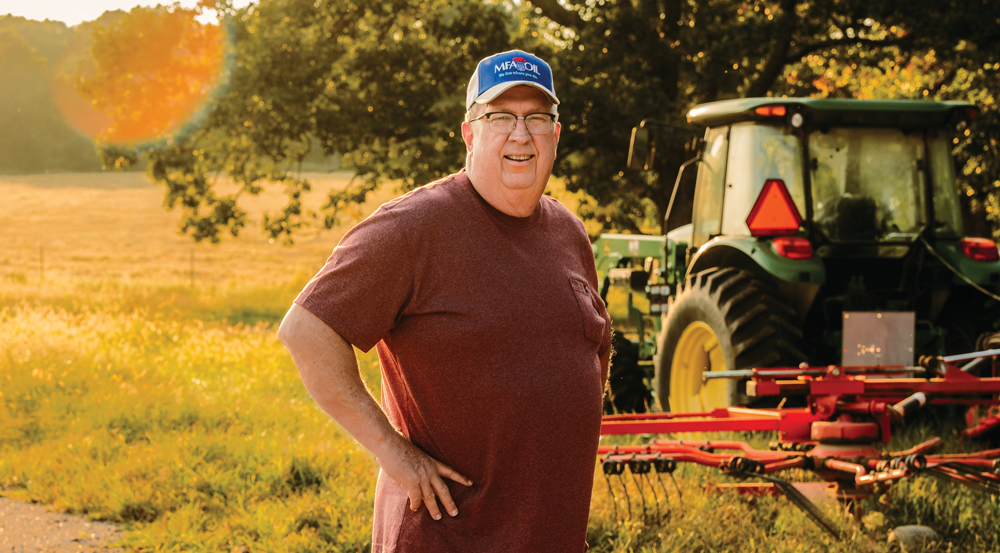
Q&A with Randy Pace of the MFA Oil Board of Directors
October 6, 2023
Written By Adam Buckallew
Randy Pace co-owns a diversified family farming operation in West Plains, Mo. He is an MFA Oil delegate and was elected to the MFA Oil Board of Directors in 2023.
Q: How would you describe yourself and your farming operation?
A: I was raised on a 167-acre beef cattle operation outside West Plains, Mo., in Howell County. After high school, I attended the University of Missouri, Columbia, and obtained a bachelor’s degree in agriculture in 1977.
After graduation, I accepted a job with the Federal Land Bank of St. Louis and continued with the Farm Credit System for 40 years, retiring in 2017. During my 40-year tenure, I had the opportunity to work throughout the states of Missouri and Arkansas.
My wife, Sherry, and I have been married for 32 years and have three children, Anna, Tanner and Brayden, and three grandchildren, Parker, Miles and Maxon, all of whom live within six miles of our farm. Our oldest son, Tanner, and his wife, Kelsey, have a farming operation adjacent to ours. We combine the two operations, which solves many of our labor issues.
Our farming operation started with the purchase of 40 acres in 1979 and has grown to approximately 750 acres owned and 600 acres rented. We run around 200 commercial Angus cows and sell calves after weaning. Our operation changed considerably after Tanner graduated from college. We now have a forage double-cropping system that centers around high-moisture baleage that we utilize and sell commercially. We typically raise triticale and Sudan grass for forage.
In 2019, we expanded our farming operation by creating Pace Valley View Farm, LLC, with Tanner and Kelsey being 50% owners. PVVF is a 20,000-hen laying operation producing approximately 7 million eggs annually. These eggs are delivered to Springfield, Mo., and processed by Vital Farms Inc. With the addition of PVVF, our operation changed considerably. No more retirement!
Q: You worked in the Farm Credit System for 40 years. What’s your current assessment of the agricultural economy?
A: During the last five years, many of us have experienced conditions within our agricultural economy that we may not have seen in the past. On this list would be the geopolitical issues we are currently experiencing that are affecting our grain prices, rising fuel costs, and the uncertainty of our supply chain interruption. Additional areas of concern would be increasing interest rates, which will continue until inflation is controlled; drought-like conditions that have limited our yields, not to mention the potential restrictions of barge traffic on our rivers; and finally, the lack of a current farm bill.
The most significant concern I see on the horizon would be the cost of capital required to start a new farming operation. As we know and many have experienced, the price of land is at unprecedented highs, not to mention the cost of equipment it takes to get started.
With all this said, there doesn’t seem to be a happy medium anymore when it comes to the prices we receive for our commodities or the costs we have to pay for our inputs. Farming operations remain viable when commodity prices are favorable, but when those prices drop while input prices remain high, things can become stressful. Regretfully, we have seen this in the past.
Q: What would you tell other farmers about the importance of taking on leadership roles in their cooperatives and the agricultural industry?
A: As generations of farmers pass, we find ourselves becoming further removed from that day in 1929 when MFA Oil was created. Without being there, it is hard to imagine all the hard work and coordination that went into this effort. We must not forget this.
As we all know, the agricultural industry is constantly changing. Due to this ever-changing environment, MFA Oil needs its members to remain focused on why MFA Oil exists and not become complacent. This can be done through strong and active delegate members at the local level providing feedback to management and the Board. We need to know what MFA Oil is doing right and what we can do to make things better.
Q: What do you think sets MFA Oil apart from its competitors?
A: The main things that set MFA Oil apart from our competitors are our employees, who strive to offer quality customer service daily, and the high-quality products the co-op provides to our agricultural communities. Another differentiator is that MFA Oil is governed by elected farmers who understand the potential impact of decisions made in the board room.
Q: What motivated you to serve on the MFA Oil Board of Directors?
A: Having worked for a farm cooperative for 40 years that provided financial services to rural America, I understood why cooperatives were essential, especially for the farm sector. Personally, I thought my experience and knowledge of farm financing could bring benefit to the board room.

